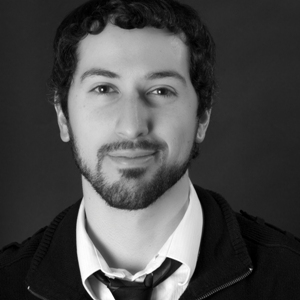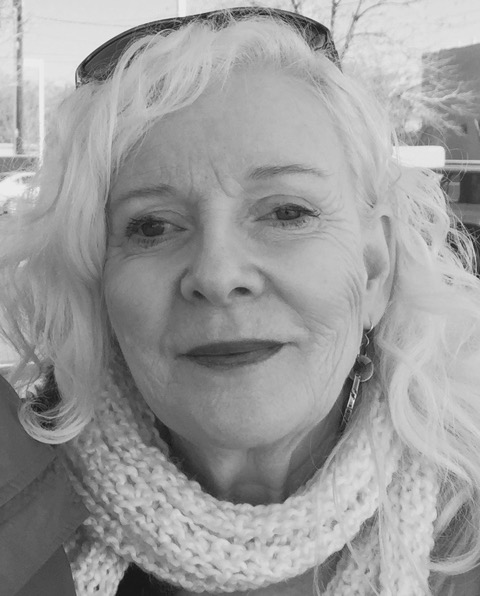Laura Esther Wolfson
“All of my stories are true, but this one really happened.”
Anonymous
 I’ve been spending a fair amount of time in the dementia ward of late. To get to where I’m going, I pass through the large common room, where some two dozen men and women sit at long tables, all alone, every single one of them, many slumped over, foreheads nearly grazing the formica. The sight makes me marvel at humans’ capacity to curve inward, forming thereby something infinite.
I’ve been spending a fair amount of time in the dementia ward of late. To get to where I’m going, I pass through the large common room, where some two dozen men and women sit at long tables, all alone, every single one of them, many slumped over, foreheads nearly grazing the formica. The sight makes me marvel at humans’ capacity to curve inward, forming thereby something infinite.
High up on the wall, images flicker. Something mid-century is playing on mute, starring a woman with broad shoulders and marcelled hair who is bantering, apparently, with some square-jawed man of few words. They’re in a dim, cramped office, playing at being reporters, probably, or maybe he’s a hard-boiled private investigator and she’s his glamorous, distraught client. They wave their cigarettes around. It is a scene—smoking indoors, for heaven’s sake—that is now the purest fiction.
In the room, a man points at me and says, “Hey, look, a muchacha!”
“A girl!” he then explains, though no one is paying attention. (I’m past 50, but if a man likes muchachas, he will see them everywhere.)
In the corner, a woman, her head crowned with white braids, calls out over and over, “Pomogeetye!” which is Russian for “Help!”
My knowledge of languages, which got me hired as a translator at a large international organization, is useful in this place, too. Each time I hear the woman with the braided crown—which is often, because she’s always calling out, every single time I come here, her powers of speech worn down to this nub of a single word that succinctly expresses all she has left to say—I think that I should go over and address her in her language, which I also speak, briefly breaking her isolation, or joining her in it. I see no sign that there is anyone else on the ward, resident, staff or visitor, who could do that.
I think now of a character in Un roman russe by Emmanuel Carrère. (In the English edition, three words have been added at the beginning of the title for some reason, expanding it to My Life is a Russian Novel.) The story is a true one, so the character is a person as well as a character, but the French are nonchalant about the non/fiction distinction, and so in France, Carrère is a novelist.
I don’t have the book at hand, and it’s been a while, so I’ll just recount it as I recall it. Feel free to fact-check, should the urge strike.
As World War II is coming to a close, a Hungarian prisoner of war washes up in a remote Soviet town. Because he speaks a language that no one in the vicinity can identify, let alone understand, and the townspeople conclude, not unreasonably, that he’s speaking gibberish, it follows that he ends up in an insane asylum. Where he remains for about half a century.
And maybe he actually is a touch insane, because during all of those decades surrounded by the Russian language, completely immersed, he learns not one single word, not one single expression—not ‘hello,’ not ‘thank you’ and not even ‘fuck your mother.’
I mention ‘fuck your mother’ because it’s nearly as frequent—in Russian, I mean—as ‘hello’ and ‘thank you,’ especially in god-forsaken provincial towns soaked in vodka and despair. You will say that this cannot be true, that no Chekhov character ever says “fuck your mother,” no matter how much despair is swirling about, but the reason for this omission should be blindingly clear: Chekhov wrote fiction.
At last the error somehow emerges, and our Magyar protagonist, no longer a prisoner of war, but of something else, is returned to what remains of his family, in Buda, or Pest, or perhaps further afield. Fanfare greets the prodigal son. Through an interpreter, an official Russian delegation that has traveled to Hungary to attend the welcome-home event proffers apologies for the lost decades.
The mayor gives a speech—in Hungarian, of course, which everyone there understands, not counting the Russians. It’s remarkable what a change of scene will do; restored to his native surroundings, the man is no longer a lunatic.
But if reading good books is supposed to make you a bigger, better person, then in my case it has failed; in the dementia ward, I do not cast off my disguise as a monolingual person—I do not step forward to speak Russian. If I were to approach the pomogeetye lady and address a few Russian words to her, she would surely cling to me and make impossible demands—I’ve experienced this with Russians who are not in dementia wards—taking me away from my mother, who I have come to see.
Next, I pick my way through the jetsam piled up near the far end of the hall: a bed frame, a scale with a platform for weighing the wheelchair-bound, a stack of walkers, a few chairs, and I see now that there is a wheelchair stranded amidst the debris, and in it, a woman, who must have miscalculated the width of passage she needed to get through.
With some words intended to soothe, I pry her loose, turn her chair around and set her on another path I think should satisfy her equally well.
“Bastard!” she howls after me.
But I’m leaving the hallway now, and entering my mother’s room. Velcro screeches as I pull away the cloth barrier stretched across the doorframe. Placed there by the staff, the barrier has a big red stop sign on it, to deter those residents who have a tendency to wander.
The woman I freed from the debris is still cursing as I step inside.
I used to own a tattered paperback by Elie Wiesel called Legends of Our Time. Held together with a rubber band, it continually shed small scraps. The book had come to me in that state, I don’t remember how. When it became too dilapidated to keep, I relegated it to recycling, saving a single page from the introduction, a page that I sensed I would someday need.
On that page, which I keep attached to the refrigerator with a magnet, Wiesel refers to an old rabbi he’d known in the little Romanian town where they both lived, a town that was wiped off the map during World War II. Decades after the war, Wiesel, a New Yorker now, calls on the rabbi, who is ensconced in Tel Aviv. Nearly as old as time, and a man of God to boot, he is of course served up as some kind of sage.
Wiesel tells the old man that he’s become a writer.
“Is that all?” says the rabbi in reproachful disbelief.
Wiesel adds that he writes stories, true ones.
The rebbe asks, “About people you knew?”
Yes, about people he might have known.
“About things that happened?”
Yes, about things that happened or could have happened.
“But they did not?” presses the rebbe.
No, says Wiesel, not all of them did. In fact, some were invented from almost the beginning to almost the end.
“That means you’re writing lies!” says the rebbe.
Things aren’t so simple, says Wiesel. Some events do take place but are not true; others are true—although they never occurred.
She’s in palliative care, which is like hospice for people who aren’t dying yet. ‘Palliative care’ means they don’t make her do anything she doesn’t want to, so she gets to spend most of her time in her room, in bed, instead of at one of the formica tables by the TV, and when she’s not up to the ordeal of being put into clothes, she passes the day in a hospital gown.
She can no longer walk, or even stand. She has to be lifted into bed from the wheelchair and back again, and she sleeps almost all the time. She regularly forgets what a fork is for and that food is meant to be swallowed.
On her nightstand are a few books I brought in when she landed here, months ago: a volume of Thackeray, pages uncut, from the matched set she kept on top of her wardrobe, a spy novel about the French Resistance and a book on modern dance, with a chapter about a choreographer, largely forgotten now, who was her teacher and friend. She doesn’t dip into the books at all.
The drawer of the nightstand is crammed with chocolate—bags, boxes and bars. The chocolates get unwrapped and popped into her mouth by whoever happens to be at her bedside at any given time.
The large window frames a stunning view of the Hudson and, on the other side, the Palisades, but she’s largely unaware. She has some vision left, but she never turns to the window—she’s always been averse to the sunlight—and she’s probably lost some ability to process shapes and colors into recognizable objects and landscapes.
In fact, when I put my face close to hers, smack in the middle of what ought to be her field of vision, I’m never sure she knows it’s me. It’s my voice she responds to, and my name.
“Hello, Ma! It’s Laura.”
Her face softens. A smile dawns.
“Hi there, baby girl,” she says to me.
Wiesel wrote something we call fiction, and he called it true. I write things that I remember, have seen or lived—I think. I’m not making it up, but I cannot swear that it all happened.
From opposite sides of the divide, Wiesel and I agree: stories live according to their own logic. They are ungovernable and uncategorizable, like schools of fish that sometimes unwittingly straddle international borders as they swim about, swishing their tails to and fro—to whom do they belong, those tranquil creatures of the sea? Turgid international treaties have been negotiated in the attempt to pin this down. Stories are also this way: blithely unaware, as they navigate the depths, of transgressing the boundaries that humans draw.
I am not a reporter, and I am not a chronicler, and I am not beholden to the facts, which are merely raw materials in a random heap. I am beholden to story, which is sculpted, intentional. I fashion aesthetic objects from found materials, not reports that say: here is what happened. In fact, the nature of what I write may depend on not being fact-checked. It may depend, to an extent, on the vagaries of memory, on misremembrance. The refractions of memory are part of the story.
While I do not think that my life story holds exceptional interest, I am more drawn to the lived than to the made up; more drawn to observing and shaping than to imagining and concocting; and more drawn to speaking in an authentic first person voice than in an imagined third that I myself don’t really believe.
On the one hand, an opera production with ruffled costumes, powdered wigs, abundant avoirdupois, scrims sliding on tracks at the flip of a switch, smoke machines, choruses, a corps de ballet, a pit orchestra and a plot that involves interlocking love triangles, multiple suicide pacts, cross-dressing, pilfered letters, goblets of poison and a masquerade ball followed by a duel at midnight. On the other hand, a lone chanteuse in a small circle of light surrounded by a larger circle of darkness, confiding ballads of heartbreak to a rapt room.
Oh, those made-up characters with lines of dialogue distributed among them and placed in their mouths, like coins under the tongues of dead Greeks, to pay their passage to the far shore; the creaking scenery and mechanisms of plot; the godlike omniscient third, godlike, alas, only within the confines of a single, small story—I just cannot work with these materials any more. As the world skids further and further off into the unbelievable, they are less and less convincing.
She never, ever talked about her life before motherhood. When I was a child, my attempts to find out about her past were efficiently shut down. I knew her as morose yet playful, and slashingly witty, so that on her lips, bile often blurred into hilarity, so long as it was not discharged in my direction. And then sometimes she was more slashing than witty (‘gasbag’ her preferred epithet for the longwinded professors who dominated my parents’ dinner parties).
She was a rigorous housekeeper, upholder of etiquette and reader of Virginia Woolf, Henry James, Edith Wharton, Nabokov, Mrs. Gaskell and both Trollopes, especially Frances. She never wore makeup, only lipstick (and that on rare occasions), but she was the Imelda Marcos of sweaters. An aficionado of the afternoon nap, upon rising she would quaff a tumbler of something grapey sloshed from a jug, then tap dance nimbly about the kitchen in little canvas shoes, a shirtwaist and a striped butcher’s apron—she had studied under Martha Graham, that I had gleaned, and she was a mean dancer, no matter the style—accompanied by the drone of Huntley and Brinkley and the sizzle of onions on the stove, crooning a ditty of her own invention—“Twinkletoes,” she called it.
Of her previous life I knew only the barest outlines. Now, though, she lives more in that past, gets lost in it, stuck amidst the clutter at the far end of the hall.
She often asks now about people long dead. Where is my mother? she demands. Why can’t I talk to her? she wants to know, her voice trembling slightly.
I remind her that my maternal grandmother—who we always thought she didn’t particularly care for, so why is she calling for her now?—departed this world in 1970.
“Of course!” She slaps her forehead. “I get mixed up about who’s alive and who’s dead.”
Then, “And what about my sisters? Are they alive?”
Dead, I tell her sadly.
“They died in a car accident, didn’t they?”
They died in bed, ten years apart.
She hesitates. But her need to know is greater than her embarrassment.
“And … what year is it now?”
As I get her unstuck and set her on another path, I see that barriers have fallen; I wander into rooms previously closed to me. I ask questions. It is my first opportunity to do so. Also, my last.
On this particular day, we’re talking about my Aunt Bea and her boyfriend Ed, who were an item in high school, during the Great Depression. (Bea was the oldest of the three sisters, my mother the youngest by many years, and, for a long, long time now, the only one still alive.)
“He was called Ed, but his real name was Isidore,” recalls my mother. “I mean, you can give your child a Jewish name, but does it have to be that Jewish?”
She chuckles.
“The whole family loved Ed; he charmed us all. And, oh! He and his brothers were so handsome, they could all have gone straight to Hollywood.”
“Why did Aunt Bea break up with him?”
She looks at me in astonishment. This all happened decades before I was born, but it’s clear what she’s thinking: you mean you don’t know?
“Oh, she dumped him when she met Paul.” That would be my Uncle Paul, whom Aunt Bea later married.
“And then she went back and forth between them for a while. Whenever she was on the outs with Paul, she’d take up with Ed again, and then she’d go back to Paul. She used poor Ed terribly. Oh, the sweet young men who got mixed up with my sister Bea!”
Mirth bursts out of her again.
“Ed eventually married Viola, who was the director of a puppet theater.”
I’m trying to memorize every word, but she’s going very fast. I can’t retain it all.
“And then, years later, after Ed and Viola split, Ed got pally with Esther…”
Esther was the middle sister, glamorous yet earthy, a divorcée when that was still a pretty louche thing to be. Her I do remember—this was long, long ago—waving a cigarette around: outdoors, indoors, in bed, at all hours, in the shower, her back to the spray as she reached around the curtain to where an ashtray teetered on the edge of the sink.
“Ed used to drop by and visit Esther sometimes, in her apartment. Remember that view of Lake Michigan from the balcony?”
I do remember, very well. I used to strap on my roller skates, tighten them with the key, skate to the end of the block, then let the wind off the lake push me back up the street to where the liveried doorman stood, smiling benevolently.
But I’m trying not to breathe or make a sound. Keep going, Ma, I think. Just keep going.
“And one day, Ed and Esther fell into bed!”
My mother, talking about sex? About someone she was close to, having sex? Talking about it in a light-hearted tone? What is happening in the world?
“Afterward,” she presses forward, and it occurs to me that she’s racing to entrust the story to me before she loses it forever, “Ed came stumbling out of the bedroom, tucking in his shirttails and exclaiming, ‘I fell in love with the wrong sister!’”
I can see Ed, whom I never actually met, gorgeous in a fortyish way. So clearly do I see Ed, in fact, that at first I think my mother must have been sitting right there in Esther’s living room when he emerged from the bedroom, bowled over by midlife sexual revelation. Otherwise, how could she tell it so vividly?
Eventually, I will realize that no, she’s simply repeating the story as she heard it from Esther. Esther would never have seduced her older sister’s old boyfriend, or anyone else, with her younger sister, or anyone else, sitting in the next room. Of course not. But she wasn’t above bragging about taking a man to bed and making his toes curl with delight, especially if said man was her big sister’s old flame and the audience for her story was her baby sister, who was by then, I’m guessing, a grown-up, married lady.
I rush home to broadcast the tale of Ed and Esther. Family and close friends are delighted. My father claims a vague memory of it, but no one else in the family has ever heard the story.
To think that this might have been lost. As so much is.
Once upon a time, before Oprah, recall, nobody got all worked up about the whole fact/fiction distinction—except maybe ancient, very literal-minded rabbis.
Take Marcel Proust, a novelist who named his first-person narrator Marcel and based the eponymous Swann on an actual art connoisseur and collector, the scion of a Jewish merchant dynasty with branches in Paris, Vienna and Odessa.
Or novelist Thomas Wolfe, largely forgotten now, except as a character in a movie starring a fearsomely miscast Nicole Kidman as his zaftig, dark-haired mistress. Wolfe changed all the names, but still he couldn’t go home again, because the folks back home were personally acquainted with and recognized the characters who peopled his books, each and every one: the alcoholic doctor; the grasping woman speculating in real estate; her semi-estranged husband the semi-crazed stonecutter, also alcoholic; the stonecutter’s stone angel; the idlers at the soda fountain; the part-time prostitutes of Niggertown, as the wrong side of the tracks was then known.
Decades ago, I knew a woman who was from the same town as Wolfe. When Look Homeward, Angel came out, she told me, her parents penciled in the real names in the margins of their copy. Then someone borrowed the book and didn’t return it, so you can add that to the list of things that never made it home again.
Anyone who knows me (and many who do not) can identify my writing as sculpted from the unadulterated raw stuff of my biography, but the end product is actually more like that game Three Truths and a Lie: most of it’s true, I mean, ‘true’ as in ‘happened’ (pace Wiesel), but there’s some other stuff that creeps in, and after a while, I’m not always sure which is which.
I don’t quite know how that other stuff gets in, because it occurs in the white heat of creation, and little of what goes on in there survives in conscious memory. I start describing, in great detail, something I don’t remember all that well, and I go on, and on, losing track of time, growing short of breath—I get whipped up, the scene becomes overlaid with more and more detail that surges up from god knows where, and this is some of the best writing that I do.
That said, the section above, about the dementia ward, contains not a grain of the invented. It’s all real. Oh, except that the muchacha incident and the woman getting caught in the debris in her wheelchair did not in fact happen on the same day—I combined them, for maximum narrative density. Does that minor change make it fiction? Or is it still nonfiction, but a kind of unethical nonfiction?
It’s a mosaic; it’s a medley; it’s a mash-up.
I don’t worry too much. It’s writing; it’s a story, not reportage; not news, fake or otherwise. It’s mine; I wrote it; call it what you like, as long as reading it lifts you, however briefly, above the quotidian—or plunges you into it more deeply.
(Filmmaker Chantal Ackerman, who made both documentaries and feature films and believed that each genre contains elements of the other, said, “Once you frame the shot, it’s fiction.” This from a documentary about her work.)
The part about the pomogeetye lady is real, though, because that happens every single time. It happened on the muchacha day, and it happened on the wheelchair-getting-stuck day, and it happens on every other day as well. But lots of other things happened on all of those days, some that I cut or omitted, and many that simply washed through the memory sieve, floated downstream into increasingly murky waters and came gently to rest in the silt.
The following week, my mission is to find out more.
“Mom, remember that story you told me about Ed? In Esther’s apartment?”
“Ed who?”
I remind her about Isidore, known as Ed; his movie-star handsome brothers; Viola and the puppet theatre; Esther; the view of the lake; Ed stumbling out of the bedroom tucking in his shirt.
She looks at me blankly.
There’s a pause. Then, she stretches luxuriously as after a long nap and says, “I really must pull myself together one of these days and get over to the library.” It’s six months since she was last off the ward, one halcyon October afternoon when she allowed me to wheel her down to the river’s edge.
Why the library, why now?
I wait.
“I need to lay my hands on a copy of Tales from Shakespeare, by Charles Lamb,” she says.
“How come?”
“I’ve been trying and trying,” she says with a weary air, “to remember the story lines of Two Gentlemen of Verona and The Merry Wives of Windsor. Can you tell me what happens in those plays?”
I regard her blankly.
Romeo and Juliet I could recount, maybe. Hamlet, in a pinch. But there would definitely be some gaps.


 Today we are pleased to feature poet Brandon Amico as our Authors Talk series contributor.
Today we are pleased to feature poet Brandon Amico as our Authors Talk series contributor. Poetry calisthenics: Chain words together so that the end part of one word becomes the first part of the next, ad infinitum: zippercentralalalandscapersonarrowboat… (zipper; percent; central; tralala; lalaland; landscape; caper; persona; sonar; narrow/arrow; rowboat…)
Poetry calisthenics: Chain words together so that the end part of one word becomes the first part of the next, ad infinitum: zippercentralalalandscapersonarrowboat… (zipper; percent; central; tralala; lalaland; landscape; caper; persona; sonar; narrow/arrow; rowboat…) Today we are pleased to feature poet Rose Knapp as our Authors Talk series contributor. Rose talks about how her poems deal with language and translation.
Today we are pleased to feature poet Rose Knapp as our Authors Talk series contributor. Rose talks about how her poems deal with language and translation. As an English instructor often tasked with teaching rhetoric and argumentation to beginning college students, I spend a lot of time thinking about my relationship with language. Language, to me, is a superpower. But my students don’t believe me. ESL struggles and the under-education afforded by “no child left behind” schools trap them within the need to translate their world, from one language to another, or from vernacular idiolects to academic prose. They tend to see the need to translate as a handicap.
As an English instructor often tasked with teaching rhetoric and argumentation to beginning college students, I spend a lot of time thinking about my relationship with language. Language, to me, is a superpower. But my students don’t believe me. ESL struggles and the under-education afforded by “no child left behind” schools trap them within the need to translate their world, from one language to another, or from vernacular idiolects to academic prose. They tend to see the need to translate as a handicap. As a writer straddling continents, I am fascinated by authors who inject foreign words and phrases into their English fiction. These international words and phrases, I believe, are helpful in lending credibility to a story. They embellish the narrative, bring authenticity and help transport the reader.
As a writer straddling continents, I am fascinated by authors who inject foreign words and phrases into their English fiction. These international words and phrases, I believe, are helpful in lending credibility to a story. They embellish the narrative, bring authenticity and help transport the reader. I’ve been spending a fair amount of time in the dementia ward of late. To get to where I’m going, I pass through the large common room, where some two dozen men and women sit at long tables, all alone, every single one of them, many slumped over, foreheads nearly grazing the formica. The sight makes me marvel at humans’ capacity to curve inward, forming thereby something infinite.
I’ve been spending a fair amount of time in the dementia ward of late. To get to where I’m going, I pass through the large common room, where some two dozen men and women sit at long tables, all alone, every single one of them, many slumped over, foreheads nearly grazing the formica. The sight makes me marvel at humans’ capacity to curve inward, forming thereby something infinite.
